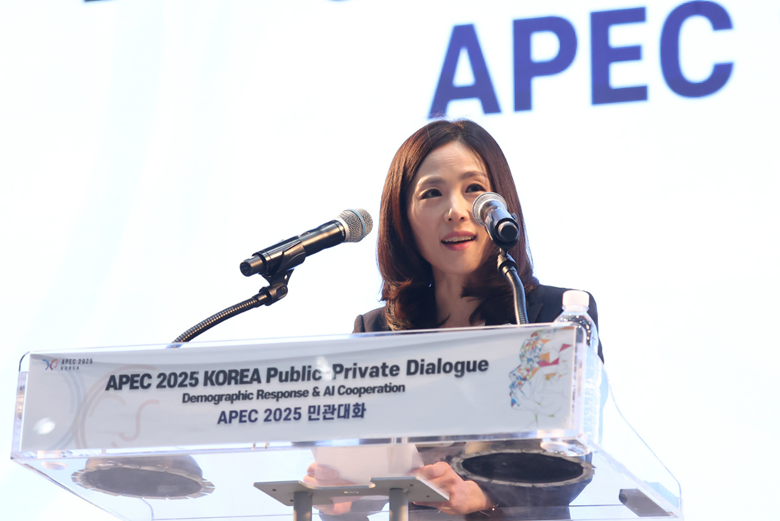
Government officials, business leaders, academics, and civil society representatives from across the Asia-Pacific convened in Incheon on Monday to confront one of the region's most pressing structural challenges: demographic change.
Opening the two-day APEC 2025 Korea Public-Private Dialogue, Korea's Vice Minister of Foreign Affairs, Jina Kim, underscored the urgency of collective action amid an aging population and slowing growth in the region.
"Demographic change is a complex and increasingly pressing challenge across the Asia-Pacific region," Vice Minister Kim said. "Korea is at the forefront of this demographic transition, facing the world's lowest birth rate and rapidly changing and aging population."
She outlined Korea's holistic and long-term domestic strategy, including an integrated care system linking healthcare, elderly care and social services; workplace gender equality measures to ensure inclusive and stable economic participation for women; and extending the retirement age to address labor shortages and enhance pension sustainability.
Citing a recent policy brief by the APEC Policy Support Unit, Vice Minister Kim noted that the overall population of the APEC region is projected to begin declining around 2035.
"Korea's proposed Collaborative Framework for Demographic Change seeks to elevate the issue as a structural priority for sustained regional attention and encourage more coordinated cross-sectoral responses," Vice Minister Kim said.
"Governments cannot address these challenges alone," she stressed. "From experts in academia to the private sector, local communities, and especially the younger generations, who will live with the consequences of the decisions. Everyone has a stake in this process."
Incheon Mayor Jeong-Bok Yoo shared his city's approach to reversing demographic decline through targeted local policies, including cash incentives for newborns and affordable housing for newlyweds.
As a result, Mayor Yoo highlighted that Incheon recorded a birth rate increase of 11.6 percent, exceeding the national average of 3.6 percent last year, more than three times higher. The city also posted real GDP growth of 4.8 percent in 2024, outpacing the national average of 1.4 percent.
The first day's discussions examined the economic, fiscal and social implications of shifting demographic patterns, drawing on case studies from APEC economies. Sessions explored policy levers to boost labor force participation, support healthy and active aging, and expand childcare and family support systems. Experts also discussed how demographic realities intersect with other structural issues such as productivity growth, fiscal sustainability, and social cohesion.
The dialogue heard from experts from global technology companies, healthcare innovators, demographic research institutes and leading financial firms, highlighting the value of cross-sector collaboration. Public and private sector participants exchanged insights on practical policy solutions, business innovations and community initiatives that could help economies adapt to demographic realities.
The dialogue turned to the second priority of APEC 2025: enhancing cooperation on artificial intelligence on the second day. Discussions will explore how AI can strengthen resilience and adaptability in the face of demographic and technological shifts, and how economies can work together to ensure that its benefits are broadly shared.






